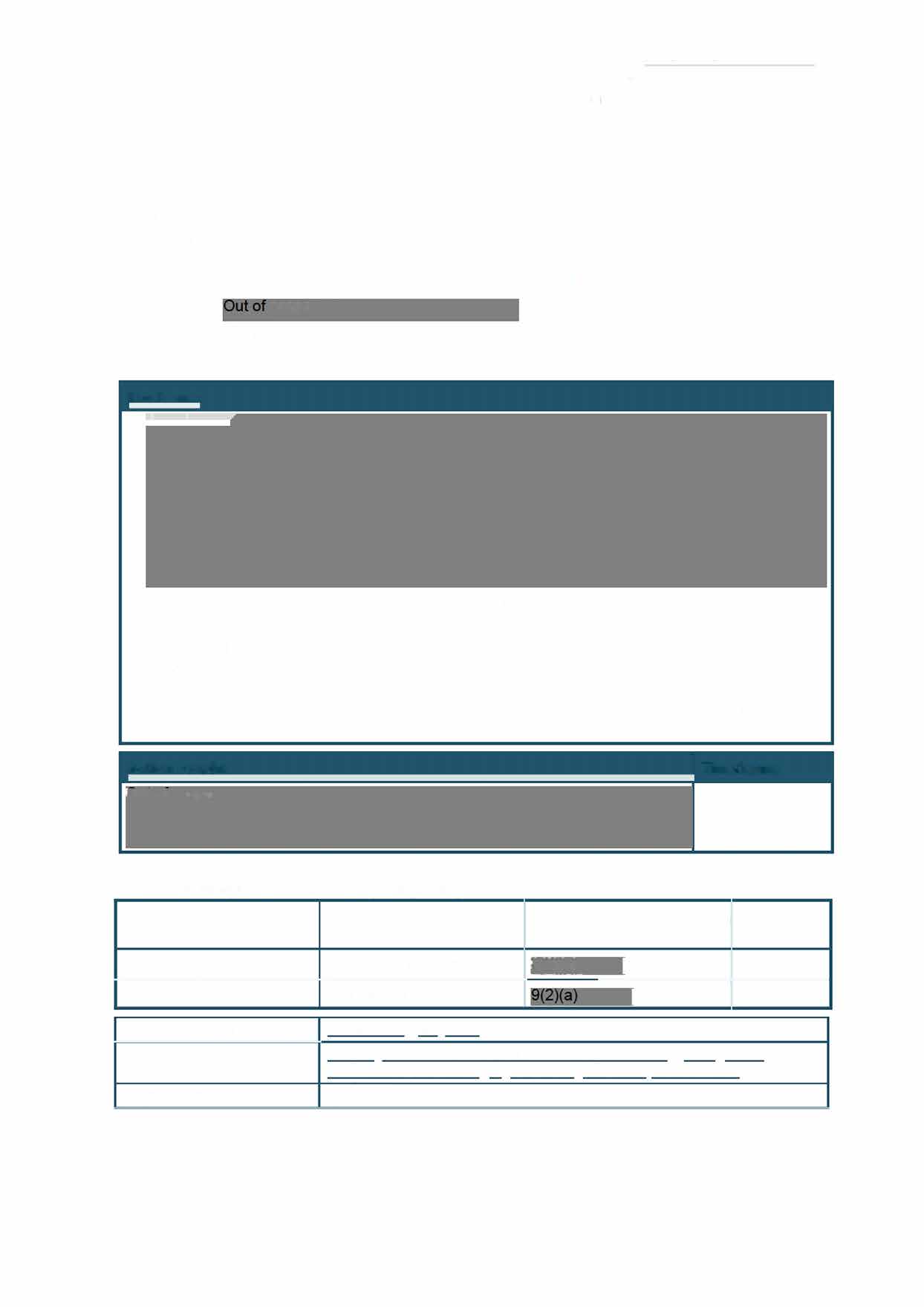
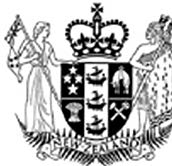
 Document 1
Priority Urgent
Te Tari Taiwhenua
Internal Affairs
Internal Affairs briefing
Hon Brooke van Velden
Minister of Internal Affairs
Title:
Royal Commission of Inquiry into COVID-19 Lessons: Further advice
on
-.-
and on receiving a report from
Document 1
Priority Urgent
Te Tari Taiwhenua
Internal Affairs
Internal Affairs briefing
Hon Brooke van Velden
Minister of Internal Affairs
Title:
Royal Commission of Inquiry into COVID-19 Lessons: Further advice
on
-.-
and on receiving a report from 1982
the Inquiry
Date:
16 May 2024
Act
Key issues
•
Information
• In the context of the proposal to establish a second phase of the Royal Commission, there are
two potential options to be considered for the receipt of the report from phase 1 of the Inquiry.
The report may be delivered to the Governor General, presented to Parliament, and made
public. Alternatively, as the statutory requirements relating to inquiry reports only refer to final
reports, the report may be presented to the Minister of Internal Affairs and made public. In
either case, the preferred arrangement will need to be set out in the amended terms of
Official
reference for the Royal Commission.
Action sought
I Timeframe
.........
the
20 May 2024
Contact for telephone discussions (if required)
under
Name
Position
Contact Number
Suggested
1st contact
Anita Balakrishnan
Acting Director Inquiries
1111 I
✓
Alan Edwards
Principal Advisor
I
Return electronic document to:
[email address]
Cohesion document reference
BRF - Ro::tal Commission into COVID-19 Lessons - advice on a1212ointing a third
Commissioner and receiving re12orts -16 Ma::t 2024.docx (cohesion.net.nz}
Released
Ministerial database reference
IA20242191
Page 1 of 5
Te Tari Taiwhenua
Department of Internal Affairs
Purpose
1.
As requested, this briefing provides advice Out of scope
and on
receiving a first report from the Royal Commission. In both cases, the context for this
advice includes your recent direction to prepare Cabinet papers proposing the creation
of a second phase of the Royal Commission.
2.
Our references here to the Royal Commission, to the Inquiry, and to a report relate to
the Inquiry and report required under the current terms of reference of the Royal
1982
Commission. The current terms of reference and the report required under it would
become phase 1 of the Royal Commission under the proposal to introduce a second
phase of the Royal Commission.
Act
Out of scope
Information
Official
the
under
Released
Page 2 of 5
Te Tari Taiwhenua
Department of Internal Affairs
Out of scope
1982
Act
Information
Official
Out of scope
the
under
Receiving a report from the Royal Commission
13.
There are statutory requirements relating to the final reports of inquiries set out in
section 12 of the Act. Royal Commission reports must be presented to the Governor
General, and then as soon as practicable the appropriate Minister must present them
to Parliament. The provisions in section 12 of the Act refer to final reports and contain
Released
no specific requirements relating to interim or other reports that may be produced by
an inquiry. The policy intention of the requirement in the Act for the appropriate
Minister to present a report to Parliament is to ensure that the reports are made
public.
Page 3 of 5
Te Tari Taiwhenua
Department of Internal Affairs
14.
All reports delivered by statutory inquiries are subject to the Official Information Act.
While there may be a short delay in their public release, either because they are under
active consideration, or because they are about to be presented to Parliament, it is
unlikely they could be withheld from the public for an extended period.
15.
Since the Inquiries Act came into force, most inquiries established under it have only
produced a single, final report. Inquiries often produce other or related publications
such as summaries, translations, or discussion documents, which are made public as
the inquiry progresses, or at the conclusion of the inquiry.
1982
16.
A significant exception to this pattern of reporting has been the Royal Commission of
Inquiry into Historical Abuse in Care. The terms of reference for that Inquiry required
it to produce at least two interim reports, in advance of its final report. The terms of
Act
reference also provide that all its interim reports are to be presented to the Governor
General and presented to Parliament by the appropriate Minister, following the same
procedure that applies to final reports. That Inquiry has now produced four interim
reports, and each one has been presented to the Governor General and to Parliament.
17.
In the context of the proposal to establish a second phase of the Royal Commission,
there are two potential options to be considered for the receipt of the report from
phase 1 of the Inquiry:
17.1 The report may be delivered to the Governor General, presented to Parliament
as soon as practicable, and made public; or Information
17.2 The report may be presented to the Minister of Internal Affairs and then made
public.
18.
In either case, the preferred arrangement will need to be set out in the amended
terms of reference for the Royal Commission.
Official
Next steps
19. Out of scope
the
under
Released
Page 4 of 5
Te Tari Taiwhenua
Department of Internal Affairs
Recommendations
Out of scope
1982
Anita Balakrishnan
Acting Director Inquiries
Act
Hon Brooke van Velden
Minister of Internal Affairs
/
/
Information
Official
the
under
Released
Page 5 of 5

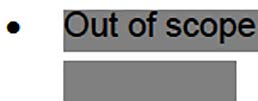
Document 2
Note on receiving and releasing the COVID Inquiry Phase 1 report - 8 November 2024
The purpose of this note is to:
•
recap previous advice from the Department on receiving the Phase 1 report.
o
The Department's previous advice of 16 May 2024 is attached as an Appendix.
•
cover how the Official Information Act (the OIA) applies to the Phase 1 report.
1982
Act
Obligations under the Inquiries Act 2013
•
There is no statutory obligation for the appropriate Minister to present the Phase 1
report to the House.
•
Section 12 of the Inquiries Act requires the final report of a Royal Commission of Inquiry
to be presented to the House of Representatives by the appropriate Minister as soon as
practicable. The report becomes public at that point.
•
Section 12 is silent on the requirements for receiving other reports from a Royal
Information
Commission of Inquiry. The terms of reference for that Inquiry generally make specific
provisions for the receipt of those reports. This is the case for the Phase 1 report.
•
Following Cabinet agreement in August, the establishment of Phase 2 of the Royal
Commission of Inquiry means the report on Phase 1 is not the Royal Commission's final
report. The revised terms of reference for Phase 1 now require the report on Phase 1 to
Official
be presented to the appropriate Minister.
•
Section 12 requires the final report of a Royal Commission of Inquiry to contain all the
the
findings and recommendations of the Inquiry. The Amendment Order establishing
Phase 2 of the Royal Commission also includes this statutory requirement.
•
The findings and recommendations from phase 1 must be included, in some form, with
the report on Phase 2, which will be the final report of the Royal Commission, and which
under
must be presented to the House by the appropriate Minister as soon as practicable after
the final report is received.
Obligations to Parliament
•
It is not clear whether there is an obligation to treat the Phase 1 report as a
parliamentary paper.
•
The report of Phase 1 could be regarded as a parliamentary paper. The relevant
Released
guidance from the New Zealand Parliament states: 'The fact that the Governor-General
has established a Royal Commission is, in itself, sufficient to establish that the report is
of a high degree of public importance and should be a parliamentary paper.'
Page 1 of 3

•
This guidance, however, refers to the Section 12 requirement to present the final report
of a Royal Commission of Inquiry to the House. No reference is made to other reports by
a Royal Commission.
•
Parliamentary papers are presented to, and published under the authority of, the
House. We are not aware of any additional guidance on the timeframe within which a
parliamentary paper must be presented to the House, other than observing any
applicable timeframes required by the statute that the paper relates to.
Obligations under the Official Information Act
1982
•
Once the appropriate Minister receives a report from an Inquiry, the reports are
subject to the O/A.
Act
•
There are two applicable grounds for withholding the Phase 1 report in response to an
OIA request:
o
The report may be withheld because the constitutional conventions for the time
being protect the confidentiality of advice tendered by Ministers and officials
[section 9(2)(f)(iv)]. This would rely on the Phasel report being under active
consideration by Ministers and officials such as a decision-making process (which
could include the Budget process) by Ministers and Cabinet that the report was
directly connected to.
Information
o
A request for the report may be refused because the report will soon be publicly
available [section 18(d)]. Guidance from the Ombudsman states that good practice
for such a refusal would advise the requester of an approximate date by which the
report would be available. If the report was to be made public more than 12 weeks
after a request was received, this ground for refusal could not be relied upon.
Official
•
A requester may complain to the Ombudsman about any decision to withhold or refuse
a request for information under the OIA.
........
the
under
Released
Page2of 3
 Appendix: Previous advice on receiving a report from the Royal Commission
Appendix: Previous advice on receiving a report from the Royal Commission
The following content has been taken from the briefing, 'Royal Commission of Inquiry into
COVID-19 Lessons: Further advice on._ ___________ __, and on receiving a
report from the Inquiry' (dated: 16 May 2024)
1.
There are statutory requirements relating to the final reports of inquiries set out in
section 12 of the Act. Royal Commission reports must be presented to the Governor
General, and then as soon as practicable the appropriate Minister must present them
to Parliament. The provisions in section 12 of the Act refer to final reports and contain 1982
no specific requirements relating to interim or other reports that may be produced by
an inquiry. The policy intention of the requirement in the Act for the appropriate
Minister to present a report to Parliament is to ensure that the reports are made
Act
public.
2.
All reports delivered by statutory inquiries are subject to the Official Information Act.
While there may be a short delay in their public release, either because they are under
active consideration, or because they are about to be presented to Parliament, it is
unlikely they could be withheld from the public for an extended period.
3.
Since the Inquiries Act came into force, most inquiries established under it have only
produced a single, final report. Inquiries often produce other or related publications
such as summaries, translations, or discussion documents, which are made public as
Information
the inquiry progresses, or at the conclusion of the inquiry.
4.
A significant exception to this pattern of reporting has been the Royal Commission of
Inquiry into Historical Abuse in Care. The terms of reference for that Inquiry required
it to produce at least two interim reports, in advance of its final report. The terms of
reference also provide that all its interim reports are to be presented to the Governor
General and presented to Parliament by the appropriate Minister, following the same
Official
procedure that applies to final reports. That Inquiry has now produced four interim
reports, and each one has been presented to the Governor General and to Parliament.
the
5.
In the context of the proposal to establish a second phase of the Royal Commission,
there are two potential options to be considered for the receipt of the report from
phase 1 of the Inquiry:
5.1
The report may be delivered to the Governor General, presented to Parliament
as soon as practicable, and made public; or
under
5.2
The report may be presented to the Minister of Internal Affairs and then made
public.
6.
In either case, the preferred arrangement will need to be set out in the amended
terms of reference for the Royal Commission
Released
Page3of 3
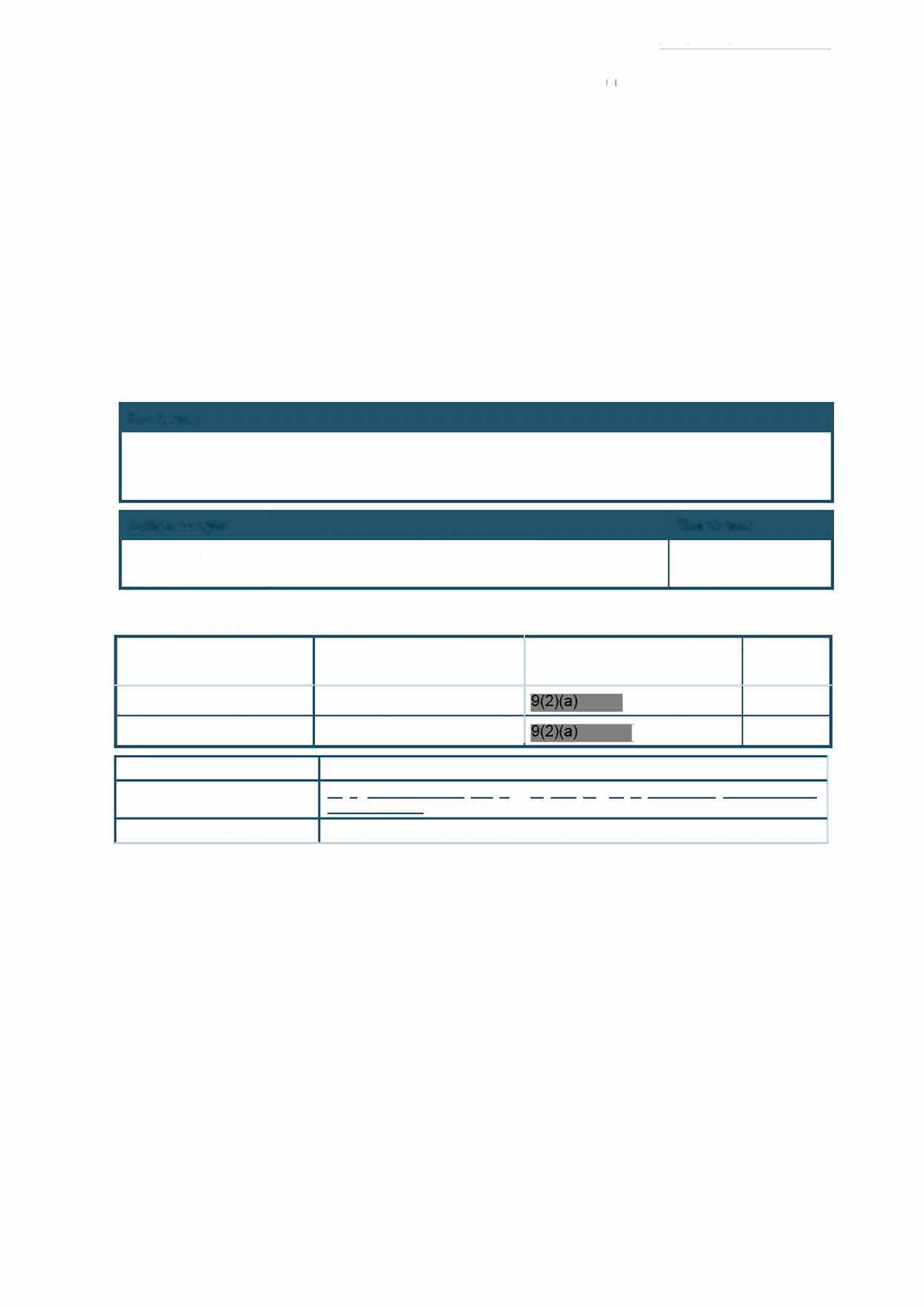
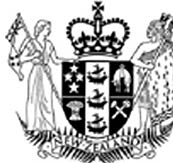

Document 3
Te Tari Taiwhenua
Priority Routine
Internal Affairs
Internal Affairs aide memoire
Hon Brooke van Velden
Minister of Internal Affairs
Title:
Royal Commission into COVID-19 Lessons: oral item at Cabinet about 1982
the phase 1 report
Date:
14 November 2024
Act
Key issues
This aide memoire provides you with information and suggested talking points to support your oral
item about the phase 1 report of the Royal Commission into COVID-19 Lessons at Cabinet on
18 November 2024.
Action sought
I Timeframe
Advise officials if you require any additional information or materials to
18 November 2024
support your oral item at Cabinet on 18 November 2024. Information
Contact for telephone discussions (if required)
Name
Position
Contact Number
Suggested
pt contact
Anita Balakrishnan
Director Inquiries
I
✓
Official
Alan Edwards
Principal Advisor
I
Return electronic document to:
[email address]
the
Cohesion document reference
httes:{Ldia.cohesion.net.nz£Sites£INQL_DHBLECOVL lal(puts£15£DocldRedir.asex?ID=ADXRF2XRTY
KY-875013860-509
Ministerial database reference
IA20244974
under
Anita Balakrishnan
Director Inquiries
Released
IN-CONFIDENCE
Page 1 of 4
Te Tari Taiwhenua
Department of Internal Affairs
Purpose
1.
This aide memoire provides you with information and suggested talking points to
support your oral item about the phase 1 report of the Royal Commission into COVID-
19 Lessons (the phase 1 report) at Cabinet on 18 November 2024.
Background
2.
Following Cabinet agreement on 26 August 2024, the terms of reference for phase 1 of
the Royal Commission require the phase 1 report to be delivered to you by 28
November 2024 [CAB-24-MIN-0314 refers]. The establishment of phase 2 of the Royal 1982
Commission means that the phase 1 report does not constitute a final report, and
therefore there is no statutory obligation for you to present it to the House.
3.
Your August Cabinet paper, ‘Phase 2 of the Royal Commission of Inquiry into COVID-19
Act
Lessons’, notes that the phase 1 report will be publicly released at a time that reflects
the Government’s approach to responding to the report and considers the timing of
any public engagement and submissions processes for phase 2 [CAB-24-MIN-0314
refers].
4.
Phase 2 may begin receiving evidence from 29 November 2024. Out of scope
Oral item at Cabinet
Information
5.
Your oral item presents an opportunity to advise your Cabinet colleagues of your
upcoming receipt of the phase 1 report, and of some of the details that will support
your consideration of when to publicly release it.
6.
Appendix A provides you with suggested talking points.
Appendix B provides you with
backpocket Q&A about the obligations related to the phase 1 report under the
Official
Inquiries Act 2013 and the Official Information Act 1982.
Recommendation
the
7.
We recommend that you:
a)
advise officials if you require any additional information or materials to
Yes/No
support your oral item at Cabinet on 18 November 2024.
under
Hon Brooke van Velden
Minister of Internal Affairs
Released
/
/
IN-CONFIDENCE
Page 2 of 4
Te Tari Taiwhenua
Department of Internal Affairs
Appendix A: Suggested talking points for an oral item at Cabinet
Background
•
The terms of reference for phase 1 of the Royal Commission of Inquiry into COVID-19
Lessons requires the phase 1 report to be delivered to me by 28 November 2024.
•
The report is not the final report of the Royal Commission, and there is no statutory
requirement to present the report to the House. However, I recognise the high degree
of interest.
Considering the public release of the Phase 1 report
1982
•
There are several considerations for the timing of the public release of the phase 1
report, including the Government’s response to the report, phase 2 of the RoyalAct
Commission, and the Official Information Act.
•
If the report were to be released at a time after phase 2 public submissions have
concluded, such as in May for example, it would enable:
o
More time for the Government to consider its initial response to the report.
o
Phase 2 to seek public submissions in a way that focuses the public on the phase 2
terms of reference.
•
However, there are some risks involved with this possible approach:
o
Phase 2 will need to ensure it has taken the procedural steps as per its statutory
Information
requirement that the conduct of the inquiry complies with the principles of natural
justice by not questioning a participant about a report the participant has not read.
o
Those procedural steps may include delaying some interviews or interviewing
people twice. This may create timing and cost pressure risks for phase 2.
•
If the report were to be released within the next three months, for example, it would
Official
enable phase 2 to operate without having to make any significant allowance for
participants being unaware of the content of the phase 1 report.
the
o However, there is a risk that this approach may put undue pressure on the phase 2
public submissions processes, with the public relitigating or being overly influenced
or constrained by the phase 1 report.
•
Until I have received the phase 1 report, it is not possible to quantify the likelihood or
extent of any impacts on phase 2.
under
•
I intend to wait until the phase 1 report is delivered before I make any decision on the
timing of its public release.
•
The Official Information Act provides adequate grounds for withholding the report while
it is being actively considered or soon to be publicly released.
Next steps
•
I am aware that it is standard practice to provide lead Ministers and their agencies with
embargoed copies of Royal Commission reports after they are delivered. I will make
Released
decisions on how and when embargoed distribution will occur after I have considered
the report.
•
I intend to issue a simple press release that acknowledges receipt of the phase 1 report.
IN-CONFIDENCE
Page 3 of 4
Te Tari Taiwhenua
Department of Internal Affairs
Appendix B: Backpocket Q&A
What are the appropriate Minister’s obligations under the Inquiries Act 2013
•
There is no statutory obligation for the Minister of Internal Affairs, who is the
appropriate Minister, to present the phase 1 report to the House.
•
Section 12 of the Inquiries Act requires the final report of a Royal Commission of Inquiry
to be presented to the House by the appropriate Minister as soon as practicable. The
report becomes public at that point.
1982
•
Section 12 is silent on the requirements for receiving other reports from a Royal
Commission of Inquiry. The terms of reference for that Inquiry generally make specific
provisions for the receipt of those reports. This is the case for the phase 1 report.
Act
•
Following Cabinet agreement in August, the establishment of phase 2 of the Royal
Commission means the report on phase 1 is not the Royal Commission’s final report.
•
The revised terms of reference for phase 1 now require the report on Phase 1 to be
presented to the appropriate Minister.
What are the obligations under the Official Information Act?
•
Once the appropriate Minister receives a report from an Inquiry, the reports are subject
Information
to the Official Information Act (the OIA).
•
There are two applicable grounds for withholding the phase 1 report in response to an
OIA request.
•
First, the report may be withheld because the constitutional conventions for the time
Official
being protect the confidentiality of advice tendered by Ministers and officials [section
9(2)(f)(iv)].
•
This would rely on the Phase1 report being under active consideration by Ministers and
the
officials such as a decision-making process (which could include the Budget process) by
Ministers and Cabinet that the report was directly connected to.
•
Second, a request for the report may be refused because the report will soon be publicly
available [section 18(d)].
under
•
Guidance from the Ombudsman states that good practice for such a refusal would
advise the requestor of an approximate date by which the report would be available.
•
If the report was to be made public more than 12 weeks after a request was received,
this ground for refusal could not be relied upon.
•
A requestor may complain to the Ombudsman about any decision to withhold or refuse
a request for information under the OIA.
Public release of reports from other Royal Commission’s received in late November
Released
•
Over the past five years, a number of reports from other Royal Commissions have been
publicly released within one month of receipt by the Governor-General or Minister,
including three interim reports from the Royal Commission of Inquiry into Abuse in Care
in 2020, 2021, and 2022, and its final report this year, and the final report of the Royal
Commission of Inquiry into the Terrorist Attack on the Christchurch Mosques in 2020.
IN-CONFIDENCE
Page 4 of 4









